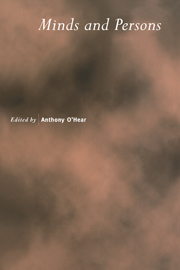Book contents
- Frontmatter
- Contents
- Preface
- Notes on Contributors
- Perceptual, Reflective and Affective Consciousness as Existence?
- The Domain of Folk Psychology
- Minds, Persons and the Unthinkable
- Moderately Massive Modularity
- A Theory of Phenomenal Concepts
- Free Will and the Burden of Proof
- Materialism and the First Person
- Language, Belief and Human Beings
- Human Minds
- Non-Personal Minds
- Personal Agency
- Mental Substances
- Mind and Illusion
- Index
Minds, Persons and the Unthinkable
Published online by Cambridge University Press: 04 August 2010
- Frontmatter
- Contents
- Preface
- Notes on Contributors
- Perceptual, Reflective and Affective Consciousness as Existence?
- The Domain of Folk Psychology
- Minds, Persons and the Unthinkable
- Moderately Massive Modularity
- A Theory of Phenomenal Concepts
- Free Will and the Burden of Proof
- Materialism and the First Person
- Language, Belief and Human Beings
- Human Minds
- Non-Personal Minds
- Personal Agency
- Mental Substances
- Mind and Illusion
- Index
Summary
In a series of lectures on minds and persons, I am going to take advantage of the occasion to ask what kind of person should one be if one has a philosophical mind. I ask the question because it is itself a philosophically contentious issue. Indeed, I shall be offering answers in a climate which is generally hostile to them. I want to raise the issue in three contexts: first, in relation to questions which have been treated epistemologically, but which I think belong to logic; second in relation to miracles; and third in relation to moral convictions. I shall spend most of my time on the first context.
What kind of a person has a philosophical mind? There is an extremely influential answer to this question which needs examining. To have a philosophical mind, it is said, is to be prepared to think what, for other people is unthinkable, to question what they would not dream of questioning. It may be thought that, in this respect, the philosopher is exercising a more general intellectual virtue. Refusal to question creates mental complacency about our present practices, and negligence about making explicit the rational justifications of those practices which possess them.
It has been suggested that a good example of philosophical complacency can be found in Wittgenstein's On Certainty. Writing in 1951, he said that it made no sense for a person to doubt whether he had been on the moon, because the issue simply did not arise.
- Type
- Chapter
- Information
- Minds and Persons , pp. 49 - 66Publisher: Cambridge University PressPrint publication year: 2003



